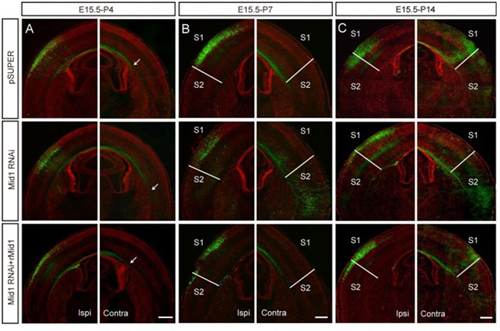Time:2013-11-19
Mental retardation is a neurological disorder typically associated with brain malformation and intellectual disability. There is increasing evidence showing that mutations on many X-linked genes can lead to different types of mental retardation. Thus studying their function provides a means to understand the physiology and pathology of the neural system.
Various mutations of Mid1 have been identified in human patients with X-linked Opitz syndrome, yet how Mid1 is involved in mammalian neural function is largely unknown. In this study, Lu Tingjia, Chen Renchao and colleagues, under the supervision of Dr. Zhi-Qi Xiong, revealed an important role of Mid1-PP2Ac signaling in axon development. They provided data from in vitro and in vivo experiments showing that silencing Mid1 promotes axon growth and branch formation, resulting in disruption of the callosal axon projection pattern. In addition, similar defects were observed in the Mid1 knockout mouse. They further showed that the abnormal axon development was largely due to the accumulation of PP2Ac in Mid1-depleted cells, as down-regulating PP2Ac in these neurons successfully restored the phenotypes. This study reveals the importance of Mid1-dependent PP2Ac turnover in normal axonal development and suggests that the dysfunction of this process may contribute to the underlying cause of Opitz syndrome.
This work entitled "X-linked microtubule-associated protein, Mid1, regulates axon development" was published online in PNAS on November 5, 2013. The research was supported by grants from the 973 Program and the Natural Science Foundation of China.

Silencing Mid1 accelerates growth and projection of callosal axons, resulting in disruption of the region-and-layer-specific projection in the contralateral cortex.
 附件下载:
附件下载: